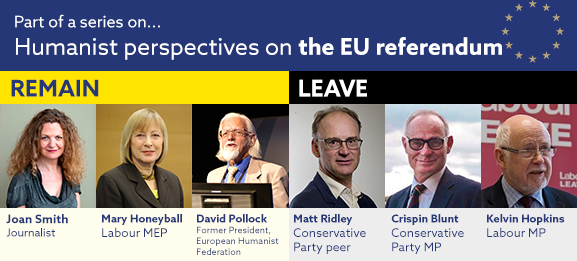This blog is part of a series of perspectives on the EU referendum from prominent humanists on either side of the debate. Each puts forward a humanist case for the United Kingdom either remaining a member of, or leaving, the European Union. All six perspectives are linked in the image below.

Joan Smith: The humanist case for staying in the EU
Ideas know no boundaries. For at least two-and-a-half thousand years, Europe has been the testing ground of ideas about who we are, why we are here and the best way to live. From Greek philosophers to French anti-theists and the English and Scots thinkers who played a key role in the Enlightenment, European thinkers have driven forward the march of progressive ideas. They’ve done it against a tragic background of internecine warfare, pitting neighbours against each other in some of the most terrible conflicts to disfigure the planet.
Against the odds, the EU has persuaded huge numbers of people to focus on what unites us rather than old divisions – just look at all the individuals and institutions outside the UK pleading with us to stay. As I write, we are part of a community of more than 500 million people living in countries with a commitment to shared values and universal human rights. Those values are vital to humanists, creating a legal framework in which we are protected from age-old demands from religious and other extremists who would like to impose their beliefs on people who don’t share them.
I love living in a European community where my right not to have a religion is protected by law. I love the fact that no member state of the EU can use barbaric punishments like the death penalty. I love the fact that equality is at the heart of the European ideal, challenging centuries of bigotry (much of it sanctioned by church and state) towards women, the disabled and LGBT people. Of course individual countries could do this on their own but it’s easier – and our hard-won rights are easier to protect – when we are part of a larger whole.
I am proud of what Europe has become since the Second World War. I don’t think for one moment that it has destroyed the nasty side of human nature, and I have watched the rise of xenophobic forms of nationalism in some European countries with horror. But I think we are stronger when our political leaders recognise that they are part of project based on universal values and respect, drawing strength from each other. That is more important for me than the economic arguments, which are in any case a no-brainer.
I live in a continent influenced by Plato, Galileo, Voltaire, Simone de Beauvoir, people with inventive minds who shaped what it means to be modern. As a humanist, I don’t want to return to the petty nationalisms and squabbles which have torn Europeans apart so many times in the past. The EU isn’t perfect but I want to remain part of a community with a commitment to equality that’s made the lives of so many people immeasurably better.